-
- About the Department
- Vision
- Mission
- Program Educational Objectives (PEOs)
- Program Outcome (POs)
- Program Specific Outcomes (PSOs)
- Faculty
- Magazines
- Syllabus & Course Outline
- Laboratories
- Practices & Innovation in Teaching Learning
- Professional Society
- Departmental Activities(Guest Lectures & Industrial Visits)
- Academic Calendar
- Project
- Research & Development
Computer Science Engineering (AI & ML)
The Computer Science Engineering (AI&ML) program at R.R. Group of Institutions (RRGI) delves deep into the exciting world of artificial intelligence and machine learning, fields that are transforming industries globally. Covering a variety of topics, this program focuses on the development of intelligent systems through the analysis of algorithms, programming languages, data structures, deep learning, neural networks, and the integration of machine learning into real-world applications.
At RRGI, we pride ourselves on providing students with world-class infrastructure, including fully equipped labs, cutting-edge tools, and regular workshops that focus on the latest advancements in AI & ML. Our curriculum also includes industrial tours and hands-on projects, ensuring that students gain practical exposure and a competitive edge in the rapidly evolving tech landscape.
AI & ML have their roots in mathematics, computer science, and data science. While these fields were initially explored within specialized departments, they have now evolved into distinct branches of engineering. From the inception of the B. Tech program in Computer Science with a focus on AI & ML at RRGI, we have continuously adapted to emerging technologies, ensuring our students are at the forefront of innovation.
Our graduates from the CSE (AI&ML) department have demonstrated exceptional skills and have secured placements in top-tier IT and tech companies such as Wipro, Accenture, Capgemini, Zensar, and others, often with impressive salary packages. This achievement reflects our commitment to fostering professional excellence and producing industry-ready engineers who excel in the fields of Artificial Intelligence and Machine Learning.
Vision
To establish a scientific & technical environment which imparts quality education to achieve excellence in the field of Computer Science & Engineering specialised in Artificial Intelligence and Machine Learning to cater the evolving needs of the industry and society by maintaining human values, morals and ethics.
Mission
- M1-To provide quality education in the field of Computer Science & Engineering and latest concepts and techniques like Artificial Intelligence and Machine Learning by adopting high-quality academic practices which enable our students to meet the demands of academia, industry, nation and the world at large.
- M2-To motivate students for higher studies, employability and research activities for the betterment of society.
- M3-To induce students with professional behaviour, leadership, ethics, morality and Indian values.
Program Educational Objectives (PEOs)
- PEO1:- Graduate of the program will be able to apply theoretical and technical principles of Computer Science & especially latest technologies like Artificial Intelligence and Machine to analyze and provide innovative solutions to real-life problems.
- PEO2:- Graduate of the program will be technically and professionally competent for employability, research & development, higher education and entrepreneurship with a zeal for continuous learning in the field of Computer Science& Engineering and related domains.
- PEO3:- Graduate of the program will be able to work individually as well as in teams with sound communicational skills.
Program Outcome (POs)
Engineering knowledge
Apply the knowledge of mathematics, science, engineering fundamentals, and an engineering specialization to the solution of complex engineering problems.
Problem analysis
Identify, formulate, review research literature, and analyse complex engineering problems reaching substantiated conclusions using first principles of mathematics, natural sciences, and engineering sciences.
Design/development of solutions
Design solutions for complex engineering problems and design system components or processes that meet the specified needs with appropriate consideration for the public health and safety, and the cultural, societal, and environmental considerations.
Conduct investigations of complex problems
Use research-based knowledge and research methods including design of experiments, analysis and interpretation of data, and synthesis of the information to provide valid conclusions.
Modern tool usage
Create, select, and apply appropriate techniques, resources, and modern engineering and IT tools including prediction and modelling to complex engineering activities with an understanding of the limitations.
The engineer and society
Apply reasoning informed by the contextual knowledge to assess societal, health, safety, legal and cultural issues and the consequent responsibilities relevant to the professional engineering practice.
Environment and sustainability
Understand the impact of the professional engineering solutions in societal and environmental contexts, and demonstrate the knowledge of, and need for sustainable development.
Ethics
Apply ethical principles and commit to professional ethics and responsibilities and norms of the engineering practice.
Individual and teamwork
Function effectively as an individual, and as a member or leader in diverse teams, and in multidisciplinary settings.
Communication
Communicate effectively on complex engineering activities with the engineering community and with society at large, such as, being able to comprehend and write effective reports and design documentation, make effective presentations, and give and receive clear instructions.
Project management and finance
Demonstrate knowledge and understanding of the engineering and management principles and apply these to one’s own work, as a member and leader in a team, to manage projects and in multidisciplinary environments.
Life-long learning
Recognize the need for, and have the preparation and ability to engage in independent and life-long learning in the broadest context of technological change.
Program Specific Outcomes (PSOs)
- The graduates should have the excellent capability to solve the problems and do innovation in the area of algorithm, data sciences, network & securities, deep learning, and web application with the help of available tools, technologies, and resources.
- The graduates should have the ability to apply multidisciplinary approaches to formulate and develop products based on existing knowledge and research for the industry and societal real problems.
Faculty Of Computer Science Engineering (AI & ML)
| Name of the Faculty | Designation | Department | Highest Qualification |
| CHANDAN KUMAR | ASST PROFESSOR (HOD) | COMPUTER SCIENCE AND ENGINEERING (ARTIFICIAL INTELLIGENCE AND MACHINE LEARNING ) | M TECH |
| SHIVA PANDEY | ASST PROFESSOR | COMPUTER SCIENCE AND ENGINEERING (ARTIFICIAL INTELLIGENCE AND MACHINE LEARNING ) | M TECH |
| NEERAJ KUMAR | ASST PROFESSOR | COMPUTER SCIENCE AND ENGINEERING (ARTIFICIAL INTELLIGENCE AND MACHINE LEARNING ) | M TECH |
| SHUBHAM JAYSVAL | ASST PROFESSOR | COMPUTER SCIENCE AND ENGINEERING (ARTIFICIAL INTELLIGENCE AND MACHINE LEARNING ) | M TECH |
| SAKSHI RAJ SINGH | ASST PROFESSOR | COMPUTER SCIENCE AND ENGINEERING (ARTIFICIAL INTELLIGENCE AND MACHINE LEARNING ) | M TECH |
| RUKHSAR | ASST PROFESSOR | COMPUTER SCIENCE AND ENGINEERING (ARTIFICIAL INTELLIGENCE AND MACHINE LEARNING ) | M TECH |
Syllabus & Course Outline
Laboratories
The Labs established by the department are as follows :
- Computer Networking Lab
- Numerical Technique Lab
- Software Engineering Lab
- Compiler Design Lab
- Artificial Intelligence/Distributed System Lab
- Design & Analysis Of Algorithms Lab
- Internet Lab
- Java Programming Lab
Practices & Innovation in Teaching Learning
RRIMT adopts a comprehensive and student-centered approach to teaching and learning, ensuring that our students are equipped with both the theoretical foundation and practical skills necessary to succeed in the competitive field of software development. Our teaching-learning methodologies are designed to promote critical thinking, problem-solving, hands-on experience, and industry relevance.
- Student-Centered Learning Approach
We follow a student-centered approach that encourages active participation, deep learning, and collaborative efforts. This methodology aligns with the current trends in education and enhances the overall learning experience by promoting greater engagement with the subject matter.
-
-
- Interactive Lectures
-
-
-
- Project-Based Learning
-
- Blended Learning
A combination of traditional classroom learning and online resources is employed to cater to different learning styles and preferences. Blended learning ensures that students not only grasp foundational concepts but also have access to additional learning material such as online tutorials, videos, and software development tools.
-
-
- e-Learning Platforms
-
-
-
- Flipped Classroom Model
-
- Hands-On Learning
In the software branches, practical learning is at the core of our methodology. We provide students with the necessary tools, platforms, and environments to apply the concepts they learn in real-time.
-
-
- Laboratory Work
-
-
-
- Industry Tools & Software
-
- Collaborative Learning and Peer Interaction
We emphasize collaborative learning, where students work in teams, mimicking industry settings. This approach develops their interpersonal and communication skills, both of which are crucial in the software development field.
-
-
- Group Projects and Hackathons
-
-
-
- Peer Review & Code Sharing
-
- Industry-Institute Interface
A key element of our teaching-learning methodology is maintaining close ties with the industry. This ensures that students are exposed to the latest trends, tools, and technologies used in the software industry.
-
-
- Industrial Visits
-
-
-
- Guest Lectures and Workshops
-
-
-
- Internships
-
- Continuous Assessment and Feedback
Assessment is an ongoing process designed to evaluate both theoretical understanding and practical skills development.
-
-
- Formative Assessments: Regular quizzes, assignments, presentations, and coding challenges assess students’ understanding and progress throughout the course.
- Summative Assessments: At the end of each semester, students undergo final exams and major projects to demonstrate their competency in software engineering concepts.
- Feedback Mechanisms: Continuous feedback from faculty, industry mentors, and peer reviews is incorporated to guide students and improve their performance.
-
- Industry-Relevant Curriculum
The curriculum is designed to match the current needs and trends of the software industry, ensuring that students are well-prepared to tackle real-world software engineering challenges.
-
-
- Modular Approach
-
-
-
- Capstone Projects
-
- Outcome-Based Education (OBE)
Our teaching-learning methodology is in line with the Outcome-Based Education (OBE) framework, which focuses on the outcomes and results of the learning process. The curriculum and teaching methods are aligned with specific program outcomes (POs) and program educational objectives (PEOs), ensuring that graduates meet the professional, ethical, and technical expectations of the software industry.
At R.R. Group of Institutions, we are committed to delivering a high-quality education in Software Engineering through an innovative and effective teaching-learning methodology. Our approach integrates theoretical knowledge with practical experience, ensuring that our students are not only prepared to meet the challenges of the industry but also equipped to lead and innovate in the evolving field of software development.
Duties of a Computer Science And Design Engineer
- Design and develop software application for different industries
- Manages the software, hardware & networks in any industry
- Involves in the design and development of the hardware components of PCs & laptops
- Develop software for peripheral computing devices such as printers, modems and scanners
- Writes code and algorithms for operating systems like Windows, Linux, etc.
As the leading Computer Science college in Lucknow, R.R. Group of Institutions (RRGI) has strived consistently to create an atmosphere of uninhibited learning and practical application of curricula for the students of our B.Tech Computer Science Department.
Careers
-
- Software Developers: Software developers are professionals who are concerned with facets of the software development process, which involves activities such as design and coding, computer programming, project management, etc.
- Hardware Engineers: These professionals do research, design, develop, test, and oversee the installation of computer hardware which inter alia includes computer chips, circuit boards, systems, modems, keyboards, and printers.
- System Designer: Professionals involved in system design, Logical & Physical design, wherein logical design can be enumerated as the structure & characteristics such as output, input, files, databases, procedures, etc.
- System Analyst: Computer engineers who work as systems analyst do research about the existing problems and plan solutions for them. They also recommend software and system-related problems and coordinate development between business development teams.
- Networking Engineers: Networking engineers are computer professionals involved in the design, implementation, and troubleshooting of computer networks.
- DBA: DBAs, or Database administrators, are the professionals who are bestowed with the job to designing, implementing, maintaining, and repairing an organization’s database. Inter alia, DBA professionals are also known as Database Coordinator or Database Programmer in IT sector.
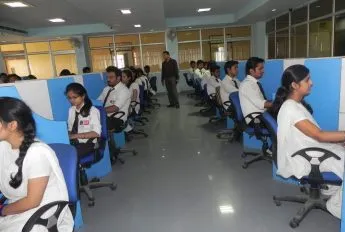

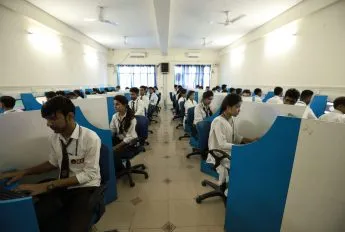
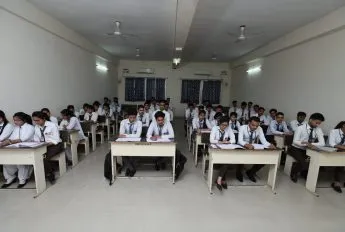
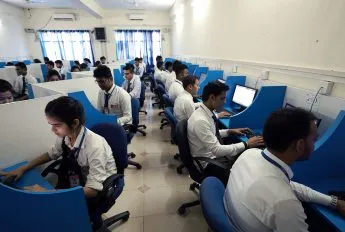
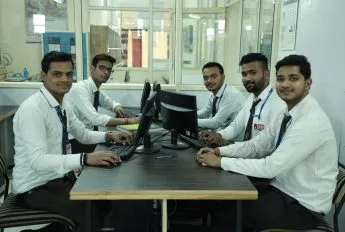
- Address
NH-24, Bakshi Ka Talab, Sitapur Road, Lucknow-226201 (UP) India - Phone
8756008853, 9161888853, 18001020833 (Toll Free) - Email
admissions@rrgi.in - rrimtedu@gmail.com
CSE (AI & ML) Artificial Intelligence & Machine Learning
At R.R. Group Of Institutions, we provide quality infrastructure to our students with fully equipped labs, time to time workshops, industrial tours and much more that makes an RRGI (R.R. Group of Institutions) the most demanded professionals in industry. Computer Science engineering has roots in electrical engineering, mathematics, and linguistics. In the past Computer Science was taught as part of mathematics or engineering departments & in recent days it has emerged as a separate engineering field. Ever since its inception of B.Tech Computer Science RRGI had continuously
provided exposure to our students on latest technologies resulting in great professionally skilled engineers. Our students from CSE branch have proved themselves by getting place top IT Companies like, WIPRO, ACCENTURE, CAPGEMINI, ZENSAR etc, With good packages.
Computer Science Engineering (AI)
Artificial Intelligence (AI) is a wide-ranging branch of Computer Science engineering concerned with developing smart machines capable of performing tasks that typically require human intelligence. Artificial intelligence (AI) is mainly the ability of a digital computer or computer-controlled robot to perform tasks commonly associated with human intelligence.
At RRGI Computer Science Engineering With Artificial Intelligence has been included in the academic curriculum since 2022. It’s a field with a very vast scope and high in demand in corporates. We at R.R. Group of Institutions have the best infrastructure and faculties for CSE (AI) among all B.Tech colleges in Lucknow. The department aims to complement theory with the best practical approach by providing assistance to the students in completing summer training projects, encouraging regular interaction with the industry via seminars, guest lectures, conferences, corporate meets, etc., and organizing intercultural exchange with other institutions and industries.
Computer Science Engineering (AI & ML)
“Artificial Intelligence is a bigger concept to create Intelligent Machines that can simulate and act human thinking capabilities and behaviors, whereas Machine Learning is an application or sub-part of AI that allows machines to learn from data without being programmed explicitly”. Artificial Intelligence is the broader concept of machines being able to carry out tasks in a way that we would consider “smart”. On the other hand, Machine Learning is a current application of AI based on the idea that we should really just be able to give machines access to data and let them learn for themselves.
Similar to CSE (AI), CSE (AIML) has also been included in the curriculum from 2022. Machine Learning is one of the most demanded skills in the computer science industry, As the world moves from the real world to a smarter metaverse, machine learning skill demand had rapidly increased. RRGI has the best infrastructure and faculties.
Artificial Intelligence and Machine Learning stands to be the best choice among colleges in Lucknow with AIML courses.
Vision
To develop a creative way in order to send the information from one place to another by means of newly invented methods and techniques or design more informative graphics which helps in understanding the information.
Mission
- To provide a quality education through state of art infrastructure and by adopting high-quality academic practices which enable our students to meet the demands of academia, industry, nation, and the world at large.
- To motivate students for higher studies, employability, and research activities for the betterment of society.
- To induce students with professional behavior, leadership, ethics, morality, and Indian values.
Program Educational Objectives (PEOs)
- Understanding of foundations, limits, and capabilities of computing.
- Ability to design and implement efficient software solutions using suitable algorithms, data structures, and other computing techniques.
- Understanding of design principles and techniques and ability to apply these for developing solutions to human/societal problems.
- Ability to independently investigate a problem that can be solved by a Human-Computer Interaction (HCI) design process and then design an end-to-end solution to it (i.e., from user need identification to UI design to technical coding and evaluation).
- Ability to effectively use suitable tools and platforms, as well as enhance them, to develop applications/products using for new media design in areas like animation, gaming, virtual reality, etc.
Program Outcome (POs)
Identify, formulate, review research literature, and analyse complex engineering problems reaching substantiated conclusions using first principles of mathematics, natural sciences, and engineering sciences.
Design solutions for complex engineering problems and design system components or processes that meet the specified needs with appropriate consideration for the public health and safety, and the cultural, societal, and environmental considerations.
Use research-based knowledge and research methods including design of experiments, analysis and interpretation of data, and synthesis of the information to provide valid conclusions.
Create, select, and apply appropriate techniques, resources, and modern engineering and IT tools including prediction and modelling to complex engineering activities with an understanding of the limitations.
Apply reasoning informed by the contextual knowledge to assess societal, health, safety, legal and cultural issues and the consequent responsibilities relevant to the professional engineering practice.
Understand the impact of the professional engineering solutions in societal and environmental contexts, and demonstrate the knowledge of, and need for sustainable development.
Apply ethical principles and commit to professional ethics and responsibilities and norms of the engineering practice.
Function effectively as an individual, and as a member or leader in diverse teams, and in multidisciplinary settings.
Communicate effectively on complex engineering activities with the engineering community and with society at large, such as, being able to comprehend and write effective reports and design documentation, make effective presentations, and give and receive clear instructions.
Demonstrate knowledge and understanding of the engineering and management principles and apply these to one’s own work, as a member and leader in a team, to manage projects and in multidisciplinary environments.
Recognize the need for, and have the preparation and ability to engage in independent and life-long learning in the broadest context of technological change.
PROGRAM SPECIFIC OUTCOME (PSOs)
- The graduates should have the excellent capability to solve the problems and do innovation in the area of algorithm, data sciences, network & securities, deep learning, and web application with the help of available tools, technologies, and resources.
- The graduates should have the ability to apply multidisciplinary approaches to formulate and develop products based on existing knowledge and research for the industry and societal real problems.
[mk_padding_divider]
FACULTY OF AGRICULTURAL ENGINEERING
HANNAN ANSARI
ASST PROFESSOR
M.Tech.
PRAVEEN KUMAR TRIPATHI
ASST PROFESSOR
M.Tech.
DIPTI RANJAN
ASST PROFESSOR
M.Tech.
RAMAKAILASH GUPTA
ASST PROFESSOR
M.Tech.
BHAWESH KUMAR THAKUR
HOD
Ph.D.
SURYA PRAKASH TRIPATHI
PRINCIPAL/DIRECTOR
Ph.D.
HARIKRISHNA MISHRA
ASST PROFESSOR
M.Tech.
AJAY KUMAR GUPTA
ASST PROFESSOR
M.Tech.
SHIVAM KUMAR SRIVASTAVA
ASST PROFESSOR
M.Tech.
ROHITASHWA PANDEY
ASST PROFESSOR
M.Tech.
RAJESH KUMAR SINGH
ASST PROFESSOR
Ph.D.
ANURAG SRIVASTAVA
ASST PROFESSOR
M.Tech.
[mk_padding_divider]
Duties of a Computer Science Engineer
- Design and develop software applications for different industries
- Manages the software, hardware & networks in any industry
- Involves in the design and development of the hardware components of PCs & laptops
- Develop software for peripheral computing devices such as printers, modems, and scanners
- Write code and algorithms for operating systems like Windows, Linux, etc.
As the leading Computer Science and design college in Lucknow, RRIMT has strived consistently to create an atmosphere of uninhibited learning and practical application of curricula for the students of our B.Tech Computer Science and design Department.
The Labs established by the department are as follows :
- Computer Networking Lab
- Numerical Technique Lab
- Software Engineering Lab
- Compiler Design Lab
- Artificial Intelligence/Distributed System Lab
- Design & Analysis Of Algorithms Lab
- Internet Lab
- Java Programming Lab
Careers
- Software Developers: Software developers are professionals who are concerned with facets of the software development process which involves activities such as design and coding, computer programming, project management, etc.
- Hardware Engineers: These professionals do research, design, develop, test, and oversee the installation of computer hardware which inter alia includes computer chips, circuit boards, systems, modems, keyboards, and printers.
- System Designer: Professionals involved in system designing, Logical & Physical Designing wherein logical designing can be enumerated as the structure & characteristics such as output, input, files, database & procedures, etc.
- System Analyst: Computer engineers who work as systems analysts do research about the existing problems and plan solutions for the problem. They also recommend software and system-related problems and coordinate development between business development teams.
- Networking Engineers: Networking engineers are computer professionals involved in designing, implementing, and troubleshooting computer networks.
- DBA: DBA or Database Administrator are the professionals who are bestowed with the job to design, implement, maintain, and repair an organization’s database. Inter alia DBA professionals are also known as Database Coordinator or Database Programmer in the IT sector.